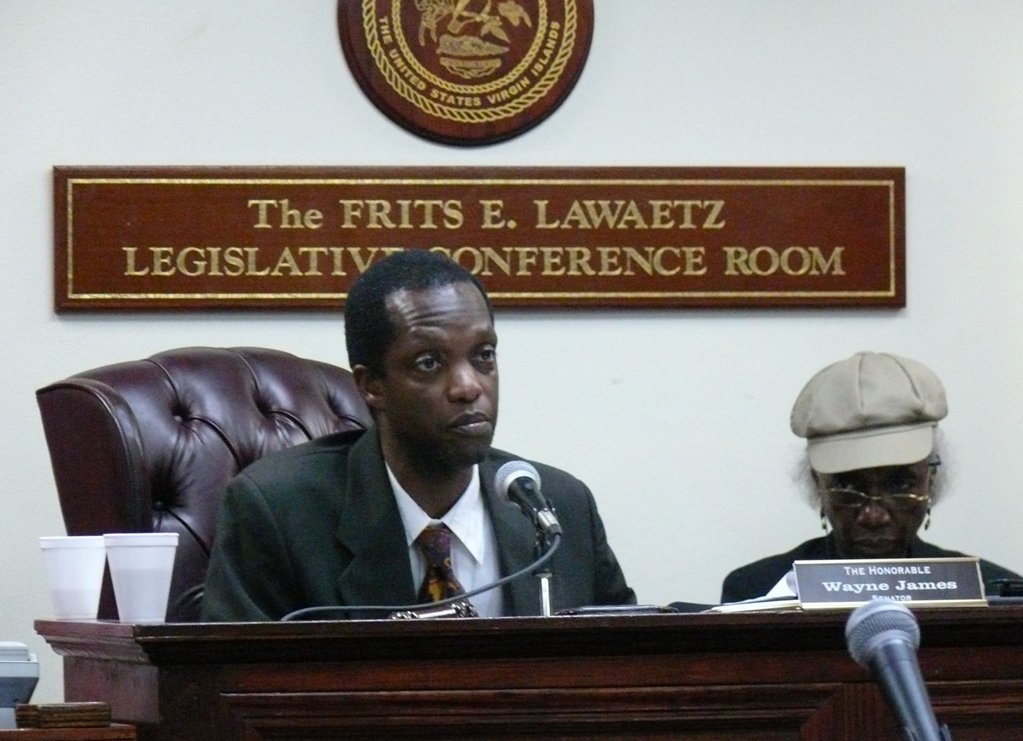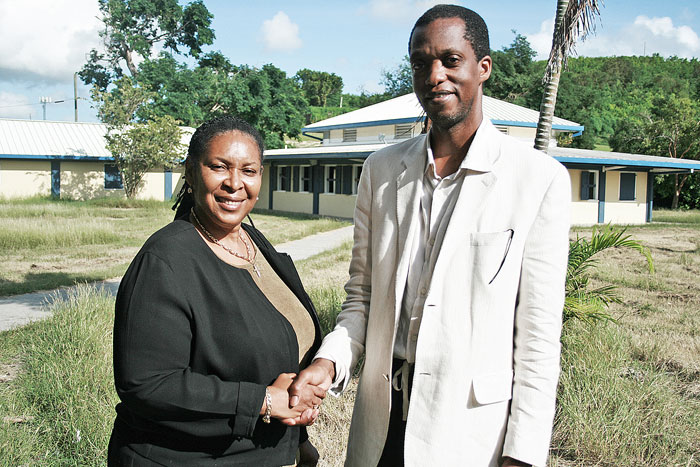MAKING FRIENDS: Marla Matthew, Principal of St. Joseph High School on St. Croix, congratulates the school’s English teacher, Wayne James, upon his election as a Senator in the Virgin Islands Legislature in November 2008.
FREDERISTED — On March 10, 2008, Wayne James, 57, was deposed in a Superior Court Civil Case relating to the disposition of certain valuable antiques in the Virgin Islands.
Some of the antiques in question were purchased by former Gov. Charles Turnbull at auction in cash.
The following is the first 18 pages of part one of the 215-page court transcript.
(Christiansted Attorney Joel H. Holt asked the questions of Wayne James that day.)
Q (Joel Holt): Can you state your name for the record, please?
A: (Wayne James): Wayne James.
Q: And where are you currently employed?
A: At St. Joseph’s High School.
Q: What is your job there?
A: I teach Caribbean history and English literature.
Q: And how long have you had that job?
A: I go back — let me see now. The first time I worked for St. Joseph’s was in 2000 — the 2000-2001 academic year. And then I promised some students that I would teach them again before they graduated, and they were seniors. So it would have been in the Fall semester of 2003, I did a semester part-time, just started the course. And then in 2000 — not this year, last year. I guess, the academic year 2005-2006. Let me just make sure. Excuse me. Last school year would have begun 2006-2007, sorry I part-timed on both semesters and then this year there was a shortage, and I taught full time, so I’m teaching full time this year.
Q: Okay. Can you tell me since 1990 what other jobs you’ve held on St. Croix.
A: Jobs. In 2004, I consulted the lieutenant governor’s office.
Q: Anything else between 1990 and the current date?
A: I don’t recall, no. I don’t recall any other job.
Q: Okay. I’m going to show you some records in a minute which might refresh your recollection. This isn’t a memory test, so the fact that you don’t recall, if we can go over some documents might help refresh your recollection. Have you ever had any of your own businesses?
A: My fashion business, Wayne James, Ltd. There was a retail business, Wayne James Retail, Inc. And Wayne James Foods.
Q: Okay. And other than St. Joseph’s and the Brodhurst Printery, were there any other companies that you think should have withheld Social Security that should be reflected on here that you worked for?
A: Companies?
Q: Any other entities? Any government employers? Any other employers?
A: I did a project, I designed some costumes for — I designed some costumes for HOVENSA and the University of the Virgin Islands, but those things were done at cost. I mean, they simply commissioned — they just — you know — I do lots of things for the public, and they asked me, you know, Mr. James, can you design these costumes , and I said: Sure. I gave them a budget, and they, to the best of my recollection, just paid what it was — how much it cost me to produce these things for them. But that was not a job. I mean, these are people who sort of came in and asked me to do them a favor, and there were costs associated with the favor. So that’s — I sent them a bill for, you know, they paid the invoice for the fabrics. They paid the invoice for the shipment and of all that stuff, and these transactions were between them and the companies. And so I was just doing them a favor. They needed to send a troupe down the street, and whoever was supposed to do it, didn’t do it, so I came in in the eleventh hour and did it.
Q: Did you receive any commission or compensation for the work for HOVENSA?
A: For the cost of making the things, whatever I had to pay the seamstress to construct those garments, yes.
Q: HOVENSA gave you a check for your cost?
A: Right. Yes.
Q: And how much about would that be?
A: I can’t remember. I have no recollection.
I mean, like I said, it, in my mind, was something — it was a public service that I was doing. I just had to cover my costs.
Q: Okay. And who was the other entity you did costumes for?
A: University of the Virgin Islands.
Q: Okay. And did they give you a check directly?
A: The same arrangement, basically, to cover for whatever I had to do to get this thing done.
MS. WASHBURN: Mr. James, let him finish his entire question before you start to answer, because you’re talking over him.
THE WITNESS (WAYNE JAMES): Okay.
Q: (JOEL HOLT): Okay, when you worked for — well, when you had the corporation, Wayne James Ltd. or Wayne James Retail, Inc., did you pay yourself a salary?
A: No.
Q: And did either one of these companies make a profit?
A: Never. No.
I mean, fashion is a very expensive business, and fashion shows cost a lot of money and things like that. So those businesses always reflected a loss.
Q: You had a spice at one point that you were promoting?
A: Yes.
Q: And that’s part of Wayne James Foods?
A: Right.
Q: Okay. Tell me about that spice.
A: Rather than doing a perfume, I did a seasoning called: “Carnival” and it’s based on a family recipe and it’s sold in some stores. And I produce it whenever I can. Right now, for example, there’s none on the shelf. I do it whenever I can.
Q: Okay. And have you ever made a profit doing that spice?
A: No. It was something that was done to promote the island. It says: “St. Croix: Made in St. Croix,” all of that stuff. It’s a product done so the islands could be promoted with something that says St. Croix.
Q: Have you ever had any investors in that project?
A: No.
The spice business?
Q: Yeah.
A: No.
Q: Did you ever get an investment from a Bob Bartner to go into that business?
A: Mr. Bartner, he never invested in the company. To the best of my recollection, I think he gave — he gave a loan or — I can’t remember. I know it was some arrangement where we were trying to get supermarket contracts to expand the business and he gave money towards that end. I don’t think it was — I don’t think — we did not get into a partnership, to the best of my recollection.
Q: Okay. What was the amount of money that he advanced you for this?
A: I think it was $110,000. If I remember correctly.
Q: Okay. It wasn’t $175,000?
A: I don’t recall that being the amount. For some reason, a hundred and ten is on my mind.
Q: Okay. What happened to those funds?
A: Those funds were used for the business, and the business did not — the contracts were not realized, and so, you know, funds were spent trying to secure the contracts, and then that was that.
Q: Okay. Who expended those funds?
A: I did.
Q: And what would you expend to procure a contract? Explain to me how you would spend the money.
A: Like travel to meet the potential accounts, and to expand — at that time, I think there was an expansion of the foods themselves. The seasoning was then augmented, if I remember correctly, to a salt-free seasoning and some sauces. I don’t remember whether the investment came before that or after. I don’t remember. But, yes, we’re talking about things that happened ten, fifteen years ago, so I’m recalling as you speak. That’s what I remember about that.
Q: Okay. So I take it it’s correct to say that Wayne James Ltd. never paid you for your services or made any money to give you a dividend for the stock you held in it; is that correct?
A: No, because everything was put back into the company.
Q: You have to say yes or no to that.
A: Sorry. Sorry. repeat the question, please.
Q: I take it that Wayne James Ltd. never made a profit or paid — I’m sorry let me strike that.Wayne James Ltd. never paid you a salary or gave you a dividend from any profits?
A: No.
Q: And I take it that Wayne James Retail, Inc. never gave you a salary or paid you any dividends for profits?
A: Never. There were expenses that had — I mean, if I had to travel for example, I would have to travel on the business, but I have never received a paycheck —
Q: Okay.
A: — on either one of those businesses.
Q: Okay. I can take it that once you started operating under the trade names of Wayne James Fashions or Wayne James Foods, the same is true, you’ve never made a profit in any of those ventures?
A: No.
Q: In looking at Exhibit No. 1, have you ever made any income other than what is set forth in Exhibit 1?
A: From St. Joseph’s?
Q: No, from anybody. Assume that St. Joseph’s records are correct and the Avis records are correct, because I don’t expect you to know that for sure; have you ever made any income from any other business or job that you’ve had?
A: Well, I mean, I did the consulting for the Lieutenant Governor’s Office.
Q: Okay. Anything else?
A: Have I ever worked for — let me see.
Provided that what you call it the — there’s the thing for the Avis, I’ve done the thing for St. Joseph’s, and the Lieutenant Governor. Yeah, I don’t recall ever working. I’ve been self-employed. I’ve never worked for people, I mean, except for these instances.
Q: Okay. But while you’ve been self-employed, have you ever made any income since 1990?
A: I’ve been able to cover expenses like rent and food and travel related to those businesses. But that’s one of the reasons — that’s one of the reasons why I organized them in the beginning as Subchapter S corporations.
Holt: Okay. Showing you Exhibit No. 2 and 3. (Deposition Exhibit No. 2 was marked for identification. Deposition Exhibit No. 3 was marked for identification.)
Q: Have you — first of all, we asked the IRS, with the authorization you gave us, to provide your income tax returns for the years 2000 to 2005. And they indicated that you never had filed an income tax return or at least they have no record of it; is that correct?
EDITOR’S NOTE: A Subchapter S (S Corporation) is a form of corporation that meets specific Internal Revenue Service code requirements. The requirements gives a corporation with 100 shareholders, or less, the benefit of incorporation while being taxed as a partnership.


